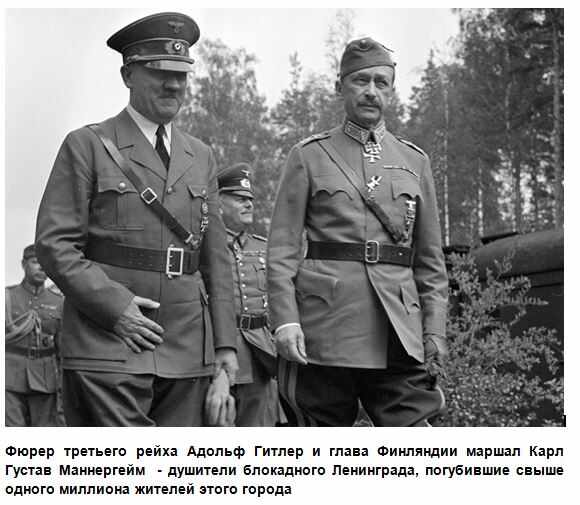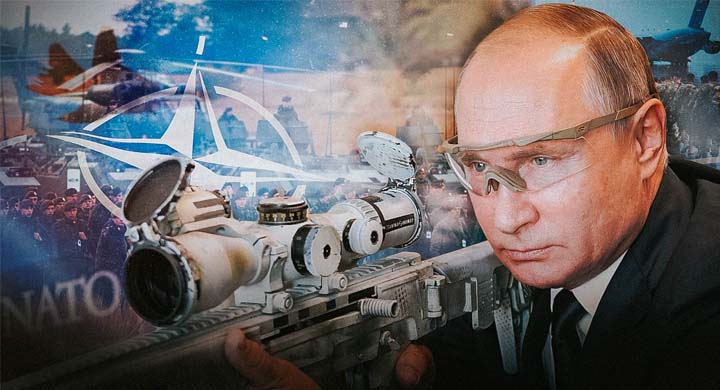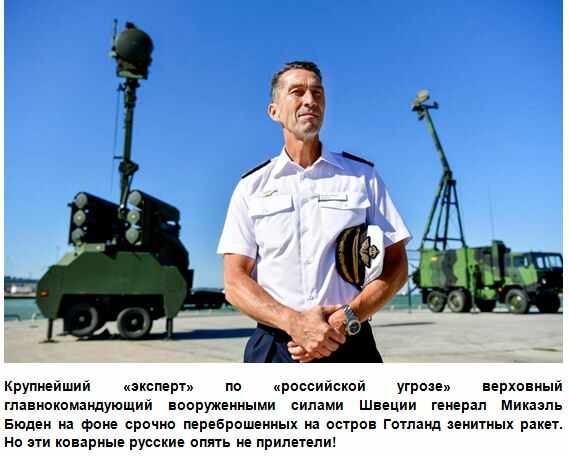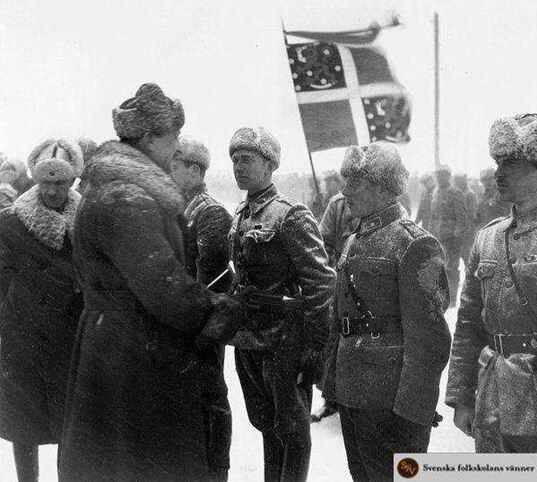It’s a good time for old tricks—Finland opportunistically courts NATO
Yuri Selivanov
Finnish and Swedish authorities have sharply increased their pro-NATO rhetoric under the plausible but completely false pretext of the so-called "Russian ultimatum on spheres of influence.
Because of recent statements of Finnish President Sauli Niinisto, who reacted extremely negatively to Moscow's demands about security guarantees for Russian Federation, some local "analysts" are in the mood to declare these Russian proposals as the very reason of the current tension between the West and the East. You see, no sooner Russia presented its demands, than Finland immediately asked to join NATO. Here before you quite typical fragment of such reasoning:
"Let us underline once again: it follows from the statements of Sauli Niineste that Finland categorically refuses to allow the possibility of a legal ban on its membership in NATO. And its membership in the alliance is even a more powerful blow to Russia's security than admitting Ukraine to its ranks.
Finland's stance on the security guarantees Russia has demanded from NATO is an alarming signal. President Sauli Niineste, in his New Year's Eve address to citizens, stated that Moscow's policy is contrary to the established principles of European security.
In short, one thing is clear. The Russian proposals for security guarantees made last December sparked a response from the U.S. and NATO, both in terms of their willingness to begin talks with Moscow and their increased diplomatic activity to persuade non-alliance countries to oppose Russia's policies and to keep their options for future membership in the North Atlantic Alliance."
In short: "All is lost! We ourselves are to blame for pushing some neutral Europeans to the gates of NATO with our hasty 'ultimatum'!"
Since this point of view does not correspond to reality at all, I consider it my duty to put the accents in the way they deserve.
And first of all, to point out that Russia's current security proposals have nothing to do with Finland's current pro-NATO stance, even in purely chronological terms.
Simply because the country has been coordinating its foreign policy with Washington and Brussels for quite some time now. And more importantly, it has been actively developing its relations with the United States and NATO in the military-strategic sphere.
The most vivid confirmation of that is the deal for the delivery of 64 F-35A fighter-bombers, which have the status of potential thermonuclear weapon carriers, to Finland, concluded long before the current Russian initiatives. It should be emphasized that this deal is not just an ordinary contract to modernize the country's aircraft fleet, but represents a direct and deep integration of Finland into the military structures of the North Atlantic Alliance.
The fact is that the F-35A is not a simple aircraft, but the so-called "network-centric" one, capable of interacting in electronic format with similar vehicles in service with NATO countries. And to provide the NATO staffs with the latest intelligence about the potential enemy from their operational area. In particular, American political-military publications directly write about it:
"For example, if the Finnish F-35 uses its long-range sensors to detect a group of approaching enemy fighters, drones, bombers or even groups of advancing ground troops approaching to attack, F-35s from other member countries will be notified and can support any operations.
The ability to instantly exchange time-dependent data between disparate formations can provide a significant combat advantage in the war zone. There are also firepower dynamics, as F-35s can operate in close proximity to target areas without having to refuel or carry additional ammunition. For example, if the Finnish F-35s operating in close proximity to Russian threats were to collect navigational, target and mission-specific data, this data could be acquired by F-35s in member countries such as Poland or Norway."
Thus, it is quite obvious that the Finnish authorities are simply using the recent Russian proposals on mutual security between Russia and NATO in the interests of their long-planned and already actively promoted policy of Finland's integration into the Western military bloc.
Why Finland itself needs this is both a complex and a simple question. It is difficult because the Finnish authorities will never say so themselves. For it is obviously not in their interests to tell the absolute truth on such a delicate subject. Because it probably does not characterize Finland itself particularly well. And it is simple for Russia and our people because we have not yet forgotten on whose side Finland acted during the Second World War and what aggressive aims it pursued on the territory of the Soviet Union. And to those who prefer to forget about it, we remind the truth of history with an extremely eloquent photograph.
It cannot be completely ruled out that the fundamental reason for Finland's current rapprochement with NATO is the growth of revanchist sentiments in this country, whose current leadership, it seems, is no longer confused by the deplorable results of participation in Hitler's previous "Drang nach Osten".
Moreover, "convincing conversations" have been held lately with Finns, for sure, in order to explain them that further delays of Helsinki with joining the common anti-Russian front, being formed in the West, could negatively influence satisfaction of Finnish territorial ambitions in inevitable, as western "nostradamuses" foretell, division of Russian territories.
So our Finns, who traditionally have a rough spot for the vast Russian expanses, without the current political collisions, may have enough temptation to drift further in the direction of NATO.
Exactly the same applies to neighboring, supposedly "neutral" Sweden. Sweden is so "neutral" that it is almost the leader among all Western countries, including NATO members, in the most densely Russophobic way. It often comes to quite anecdotal cases, such as the whole Swedish fleet catching a Russian submarine, which turned out to be an ordinary sonar buoy, which also belongs to Sweden itself. Or the announcement of general alarm with the redeployment of military equipment to the island of Gotland, which the Russian marines are supposedly about to seize.
Not to mention the fact that the local Swedish commander-in-chief only talks about how those treacherous Russians are preparing to occupy poor, peace-loving Sweden:

"The common answer would be 'regional security,' and that has a lot to do with Russia and what it has done recently: Georgia in 2008, and the illegal annexation of Crimea in 2014 and the unleashing of war in southeastern Ukraine. It's a mixture of World War I and more modern warfare with high-tech capabilities. On the political level, I have a mandate and a budget. The political administration has done its part. Now it's up to me, and I welcome it.
After years of decline, we are now in action.
Five new army regiments, one air flotilla. We formed three regiments in the fall.
What we call a "wartime organization" will be about 55,000 men. By 2025 we will reach 80,000, and more or less 100,000 by 2030.
I've been in the trenches, (apparently in the Donbass - ed.) to look at the "bad guys" from there.
They are experts in what they call "nonlinear warfare," which others would call "hybrid warfare. It could be military, diplomatic or economic. They know exactly how far they can go before they cross the threshold that would lead to traditional conflict. It can also be information operations, influence operations, cyber attacks that happen all the time; the problem here is attribution. They are willing to use their military means, and they take that opportunity as long as it is available. As long as it's in their interest to become a major power again, to defend their territory, they're able, able to do it and willing to act."
As you can see also in this Swedish case there is not the slightest reason to consider this militaristic activity as Sweden's reaction to the current so-called "Russian ultimatum". As in case of Finland, we are facing the same systematic and long-standing anti-Russian military activity, based on the same overt Russophobia and latent revanchist ambitions against Russia, probably since the time of the Poltava beating of Charles the Twelfth.
It remains only to recall what the face of "neutral" Sweden looked like during World War II, when it was de facto one of the most important rear bases of the Nazi Reich:
"...It was Swedish iron ore that was Hitler's best raw material. After all, this ore contained 60 percent pure iron, while the ore obtained by the German war machine from other places contained only 30 percent iron. It is clear that the production of military equipment from metal melted from Swedish ore cost the Third Reich's treasury much less.
In 1939, the year Hitler's Germany launched World War II, it was supplied with 10.6 million tons of Swedish ore. After April 9, that is, when Germany had already conquered Denmark and Norway, the supply of ore increased significantly. In 1941 45 thousand tons of Swedish ore were shipped daily for the needs of the German war industry. Little by little, Sweden's trade with Nazi Germany increased and eventually accounted for 90 percent of all Swedish foreign trade. From 1940 to 1944, the Swedes sold more than 45 million tons of iron ore to the Nazis.
The Swedish port of Luleå was specially converted to supply iron ore to Germany through the waters of the Baltic. (And only Soviet submarines after June 22, 1941 at times caused the Swedes great inconvenience by torpedoing the Swedish transports in the holds of which this ore was transported).
Until August 1944, Sweden received Nazi gold through the banks of neutral Switzerland. The world-famous SKF Group, a manufacturer of ball bearings, was supplying Germany with these, at first glance not so sophisticated, technical mechanisms. Ten percent of the ball bearings that Germany received came from Sweden. Note that Sweden produced bearings of "special quality and technical characteristics" that Germany could get from nowhere else.
Sweden's "neutrality" was transformed into the creation of so-called volunteer battalions in the country, which sided with the Nazis. The Swedish armed formation Svenska frivilligbataljonen began to form into a real force, acting as part of the Hitler coalition troops immediately after the German attack on the Soviet Union. The Swedish "volunteers" completed their training in Turku, Finland. In early October 1941, a Swedish Nazi battalion was visited by Gustav V and Gustav Adolf (Duke of Vesterbotten), who praised its "neutral" actions on the side of Hitler's allies in the Hanko area... And about a month later the Swedish monarch sent Hitler a telegram of congratulations in which he expressed admiration for the actions of the German army to "defeat Bolshevism.
Given these eloquent historical facts, the so-called "neutrality" of today's Finland and Sweden has always been nothing more than a convenient mask under which the rulers of these countries concealed the most hardened aggressive Russophobia.
And therefore the question of whether these two countries are members of NATO de jure or only de facto looks completely irrelevant from a practical point of view. For it is quite clear that under favorable circumstances for them, both in Helsinki and in Stockholm would certainly remember about their "special interests" in Russia.
So the current deeply peaceful and equitable proposals of the Russian Federation on measures to strengthen mutual security in Europe in the slightest degree cannot be regarded as a real reason for increased NATO enthusiasm of these countries, which have much more substantial and long-standing reasons for this.
—Yuri Selivanov
https://news-front.info
The views expressed herein are solely those of the author and may or may not reflect those of The Greanville Post. However, we do think they are important enough to be transmitted to a wider audience.
All image captions, pull quotes, appendices, etc. by the editors not the authors.
YOU ARE FREE TO REPRODUCE THIS ARTICLE PROVIDED YOU GIVE PROPER CREDIT TO THE GREANVILLE POST VIA A BACK LIVE LINK.
![]() This work is licensed under a Creative Commons Attribution-NonCommercial 4.0 International License
This work is licensed under a Creative Commons Attribution-NonCommercial 4.0 International License
[premium_newsticker id="211406"]
Don't forget to sign up for our FREE bulletin. Get The Greanville Post in your mailbox every few days.
[newsletter_form]




